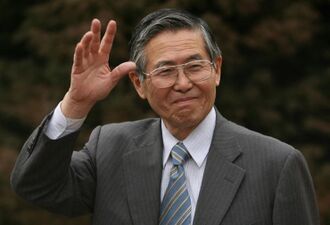Alberto Fujimori
Alberto Fujimori (July 28th, 1938) is a former Peruvian politician who was President of Peru from 1990 to 2000. His government is credited with the creation of Fujimorism, defeating the communist Shining Path insurgency and restoring Peru's macroeconomic stability. Fujimori ended his presidency by fleeing Peru for Japan amid a major scandal involving corruption and human rights violations.

|
| “ | What we are doing in fact is recovering and progressing and sustaining the recovery of our democracy. | „ |
| ~ Alberto Fujimori |
Though he uprooted terrorism in Peru he is criticized for his dictatorial rule of Peru after 1992. He was arrested and was found guilty of various criminal offences and pled guilty to bribery. On Wednesday April 7th, 2009; at the age of 70, was sentenced to 25 years of prison for crimes against humanity in the cases of killings of Barrios Altos and University of La Cantuta made during his term by his Grupo Colina death squad.
On Sunday December 24th, 2017; he was controversially pardoned by his president Pedro Pablo Kuczynski and released on "humanitarian grounds" as his health failed.[1] The pardon was overturned by Peru's Supreme Court in October 2018 and Fujimori was ordered back to prison. On January 23, 2019, Fujimori was sent back to prison to complete his sentence with his pardon formally being annulled a month later.
Criticism edit
Detractors have observed that Fujimori was able to encourage large-scale mining projects with foreign corporations and push through mining-friendly legislation laws because the post auto-coup political picture greatly facilitated the process.
Some analysts state that some of the GDP growth during the Fujimori years reflects a greater rate of extraction of non-renewable resources by transnational companies; these companies were attracted by Fujimori by means of near-zero royalties, and, by the same fact, little of the extracted wealth has stayed in the country. Peru's mining legislation, they claim, has served as a role model for other countries that wish to become more mining-friendly.
Fujimori's privatization program also remains shrouded in controversy. A congressional investigation in 2002, led by socialist opposition congressman Javier Diez Canseco, stated that of the USD $9 billion raised through the privatizations of hundreds of state-owned enterprises, only a small fraction of this income ever benefited the Peruvian people.
The one instance of organised labour's success in impeding reforms, namely the teacher's union resistance to education reform, was based on traditional methods of organisation and resistance: strikes and street demonstrations.
Some scholars claim that Fujimori's government became a "dictatorship" after the auto-coup, permeated by a network of corruption organized by his associate Montesinos, who now faces dozens of charges that range from embezzlement to drug trafficking to murder (Montesinos is currently[when?] on trial in Lima). Fujimori's style of government has also been described as "populist authoritarianism". Numerous governments and human rights organizations such as Amnesty International, have welcomed the extradition of Fujimori to face human rights charges. As early as 1991, Fujimori had himself vocally denounced what he called "pseudo-human rights organizations" such as Amnesty International and Americas Watch, for allegedly failing to criticize the insurgencies targeting civilian populations throughout Peru against which his government was struggling.
In the 2004 Global Corruption Report, Fujimori made into the list of the World's Most Corrupt Leaders. He was listed seventh and he was said to have amassed $600 million, but despite years of incarceration and investigation, none of these supposed stolen funds have ever been located in any bank account anywhere in the world.
Support edit
Fujimori did have support within Peru. The Universidad de Lima March 2003 poll, taken while he was in Japan, found a 41% approval rating for his administration. A poll conducted in March 2005 by the Instituto de Desarrollo e Investigación de Ciencias Económicas (IDICE) indicated that 12.1% of the respondents intended to vote for Fujimori in the 2006 presidential election. A poll conducted on 25 November 2005, by the Universidad de Lima indicated a high approval (45.6%) rating of the Fujimori period between 1990 and 2000, attributed to his counterinsurgency efforts (53%). An article from La Razon, a Peruvian newspaper, stated in 2003 that: "Fujimori is only guilty of one big crime and it is that of having been successful in a country of failed politicians, creators of debt, builders of mirages, and downright opportunistic."
According to a more recent Universidad de Lima survey, Fujimori still retains public support, ranking fifth in personal popularity among other political figures. Popular approval for his decade-long presidency (1990–2000) has reportedly grown (from 31.5% in 2002 to 49.5% in May 2007). Despite accusations of corruption and human rights violations, nearly half of the individuals interviewed in the survey approved of Fujimori's presidential regime. In a 2007 Universidad de Lima survey of 600 Peruvians in Lima and the port of Callao, 82.6% agreed that the former president should be extradited from Chile to stand trial in Peru.
The Lima-based newspaper Perú 21 ran an editorial noting that even though the Universidad de Lima poll results indicate that four out of every five interviewees believe that Fujimori is guilty of some of the charges against him, he still enjoys at least 30% of popular support and enough approval to restart a political career.
In the 2006 congressional elections, his daughter Keiko was elected to the congress with the highest vote count. She came in second place in the 2011 Peruvian presidential election with 23.2% of the vote, and lost the June run-off against Ollanta Humala. She again ran for President in the 2016 election, narrowly losing the run-off to Pedro Pablo Kuczynski.
